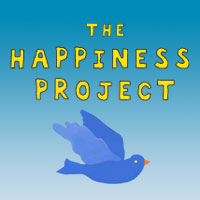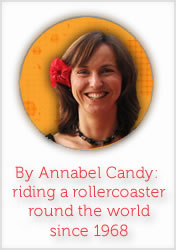The Happiness Project Review and 23 Takeaways

Although Gretchen Rubin, her book The Happiness Project and her blog have been on my radar for years I’ve never read her stuff properly before. I’m not sure who started blogging first, Gretchen (check out her blog here) or me (I’ve been blogging since 2008 and launched Get In the Hot Spot in 2009), but I do know envy stopped me from reading The Happiness Project.
Comparing yourself to other people is always a recipe for unhappiness but it’s one of my worst habits. Although I didn’t know much about Gretchen it seemed to me that our blogging topics were similar or related but her blog became wildly successful compared to mine partly because she was so well-connected within US blogging circles.
Then it seemed as if her book was an instant bestseller too while I was floundering around changing blog topics, starting new blogs, starting new businesses and generally struggling to find my way.
So I childishly didn’t read The Happiness Project which came out in 2009 until last month even though I’m a sucker for self-help books.
Then a friend in my writer’s group suggested I read it to see how the book weaves personal story and scientific data because she thought it would help me write the 52 Exercises Quest book. So I finally read it and of course I loved it.
Here are my notes and takeaways. I hope it inspires you to read The Happiness Project or any one of Gretchen’s other books. I’m keen to read her follow up book Happier at Home next.
The Happiness Project: Notes and Takeaways
This is such a great book and I’m sure you can learn as much about me from the notes I took as you can about your self from reading it.
1. Take a moment to evaluate how happy you are
You can take the Authentic Happiness Project Questionnaire to see how happy you are now here. Gretchen was already happy before she started her happiness project but she wanted to be happier.
2. Your relationships with women are more important than those with men
Because women and men have wildly different ideas about what intimacy is.
“Although men and women agree that sharing activities and self-disclosure are important, women’s idea of an intimate moment is a face-to-face conversation, while men feel close when they work or play sitting alongside someone.”
“Perhaps because men have this low standard for what qualifies for intimacy, both men and women find relationships with women to be more intimate and enjoyable than those with men.”
3. Challenge and growth are the keys to happiness
I knew this instinctively which is no doubt why I’m constantly setting myself new challenges but it was great to see it’s normal to want growth and to adapt to present circumstances and want more.
“This “hedonic treadmill,” as it’s called, makes it easy to grow accustomed to some of the things that make you “feel good,” such as a new car, a new title or air-conditioning, so that the good feeling wears off. An atmosphere of growth offsets that… Growth is important in a spiritual sense and I do think that material growth is gratifying as well.”
“To be happy, I need to think about feeling good, feeling bad, and feeling right in an atmosphere of growth.”
“Challenge and novelty are key elements to happiness. The brain is stimulated by surprise, and successfully dealing with an unexpected situation gives a powerful sense of satisfaction. If you do new things – visit a museum for the first time, learn a new game, travel to a new place, meet new people – you’re more apt to feel happy than people who stick to familiar activities.”
4. Working towards a goal makes you as happy as achieving it
“The challenge, therefore, is to take pleasure in the “atmosphere of growth,” in the gradual progress made toward a goal, in the present. The unpoetic name for this very powerful source of happiness is “pre-goal-attainment positive affect.”
“But the arrival fallacy doesn’t mean that pursuing goals isn’t a route to happiness. To the contrary. The goal is necessary, just as is the process toward the goal.”
“Enjoy the process.”
“Any single happy experience may be amplified or minimized, depending on how much attention you give it.”
“In what’s known as “rosy prospection,” anticipation of happiness is sometimes greater than the happiness actually experienced. All the more reason to revel in anticipation.”
5. We have to please ourselves not others
“To enjoy now, there was something else I was going to have to master: my dread of criticism. Too much concern about whether I was getting praise or blame, too much anticipatory anxiety about what my detractors would say.”
6. To make other people happy acknowledge their feelings
Even if you don’t agree with them or think their feelings are well-founded. People need to feel acknowledged, heard and understood. This is especially important when dealing with children.
“Experts say that denying bad feelings intensifies them; acknowledging bad feelings allows good feelings to return.”
7. Don’t be embarrassed to relish childish pleasures at any age
Rubin quotes C. S. Lewis from his essage “On Three Ways of Writing for Children”:
“When I was ten, I read fairy tales in secret and would have been ashamed if I had been found doing so. Now that I am fifty, I read them openly. When I became a man I put away childish things, including the fear of childishness and the desire to be very grown up.”
8. Be yourself
Relinquish your fantasies about what you’d like to enjoy and just enjoy what you actually. Don’t be sad about what you can’t do. Enjoy what you can do.
“I don’t like having to try to make myself like things. I want to spend more time on the things I already like.”
9. Spread happiness and be near people who spread it too
“In a phenomenon called “emotional contagion,” we unconsciously catch emotions from other people – whether they are good moods or bad ones. Taking time to be silly means that we’re infecting one another with good cheer, and people who enjoy silliness are one third more likely to be happy.”
10. We need to focus on happiness all the time
“As Samuel Johnson said, “The business of the wise man is to be happy.” In whatever condition life happens to offer.”
11. Find five friends
“You need close long-term relationships, you need to be able to confide in other, you need to belong. Studies show that if you have five or more friends with whom to discuss an important matter, you’re far more likely to describe yourself as “very happy”.
12. Don’t isolate yourself
Spending time with other people is key because “no matter what they’re doing, people tend to fell happier when they’re with other people. One study showed that whether you are exercising, commuting, or doing housework, everything is more fun in company.”
14. It’s normal to search for happiness even if you’re already prosperous financially
“As countries become richer, theiir citizens become less focused on physical and economic security and more concerned with goals such as happiness and self-realization. Prosperity allows us to turn our attention to more transcendant matters – to yearn for lives not just of material comfort but of meaning, balance and joy.”
15. Being in the now is key
I’ve already written lots about mindfulness including mindfulness for beginners, books on mindfulness and The Power of Now but Rubin reminds us:
“A common theme in religion and philosophy, as well as in catastrophe memoirs, is the admonition to live fully and thankfully in the present.”
16. Fake it ’til you make it and show happiness when you feel it
Rubin chooses Saint Thérèse of Lisieux as a spiritual master to inspire her and emulate and notes:
“I set out to imitate Thérèse by doing a better jog of acting happy when I knew that my happiness would make someone else happy. I didn’t want to be fake but I could make an effort to be less critical. I could look for ways to be more honestly enthusiastic – about foods that weren’t necessarily my favourite things, activities that weren’t my first choice, or movies, books, and perfomances with which I could find fault. Usually I could find something to praise.”
17. Don’t exploit feelings of unhappiness
Many people use unhappiness to get attention or get what they want.
“It’s more selfless to act happy. It takes energy, generosity, and discipline to be unfailingly lighthearted, yet everyone take the happy person for granted. No one is careful of his feelings or tries to keep his spirits high. He seems self-sufficient he becomes a cushion for others. And because happiness seems unforced, that person usually gets no credit.”
“I saw that I needed to make a bigger show of my happiness.”
“For the love of my family and friends, so loving toward me, I tried to appear happy and especially to be so.”
18. Pursue your passions – even if they feel like a waste of time
I often feel guilty about blogging because it takes up a lot of time and energy and is mostly unpaid. That makes me feel guilty because it’s time I think I should spend doing paid writing but Rubin gives me permission to enjoy it anyway.
“Whatever your passion might be, happiness research predicts that making time for a passion and treating it as a priority instead of an “extra” to be fitted in at a free moment (which many people practically never have) will bring a tremendous happiness boost.”
This extends to so many of my passions – things like baking cakes, beach walks and bird spotting. I guess the point of them is to make me feel happy and then I can share that happiness with others I come into contact with.
19. Being productive takes focus but brings happiness
We can get extraordinary sense of accomplishment from doing hard things. Like writing a novel, doing a degree or even just calling someone we’ve been meaning to call for a while.
20. Happiness is inside us
Rubin began collecting koans, a question or statement that can’t be understood logically and was particularly interested in:
“He, who would bring home the wealth of the Indies, must carry the wealth of the Indies with him.”
Samuel Johnson
“It is in vain to dream of a wildness distant from ourselves… I shall never find int eh wolds of Labrador any greater wildness than in some recess of Concord, i.e. than I import into it.
Henry David Thoreau
Rubin realises “if I wanted to find happiness, I had to carry happiness with me.”
21. People succeed in groups
So if you want to happy spend time with happy people. If you want to be a great business person spend time with business leaders. I like this idea because I know it to be true and I found another quote recently (not in this book) that has a similar idea:
“If you want to soar like an eagle don’t hang out with turkeys.”
The idea is that if you want to improve yourself, look for groups that will improve you through association. If you want to make something positive of yourself and your life spend your time with the best people you can.
I’ve been implementing this by taking part in a business mastermind group, a writing group and a running group. It’s immediately obvious with running that the only way to improve my run my running is to run with people who are better at running than I am. I’ve been doing that and my running has improved hugely as covered in what it feels like to challenge yourself.
22. Do new things and stick with them long enough to see results
I always tell people they need to blog for six months to a year before they can expect to see any benefits. That’s true of so many things. You have to invest time and energy before you see the rewards so you have to practice getting through pain and frustration and sticking with your goal anyway.
“Novelty and challenge bring big boosts of happiness. Unfortunately, novelty and change also bring exhaustion and frustration.”
23. Bank happy thoughts to redress the balance of bad ones
We have a negativity bias that means for example in marriage it takes at least five good acts to repair the damage of one critical or destructive act. When our minds are unoccupied they tend to drift to negative thoughts and ruminations. To counter that we should have a memory bank of happy thoughts to turn to when we notice we’re ruminating.

Want More HOT Travel and Wellbeing Tips and Ideas?
Get In the Hot Spot’s free newsletter is a weekly injection of tips to help you be more adventurous, have more fun and feel fabulous. Click here now to get free weekly email updates.
Share This Story, Choose Your Platform!
6 Comments
Leave A Comment
You must be logged in to post a comment.









I am so using the ‘I don’t like spending time trying to like things. I spend more time on the things I like’ line xxx
Hi Teresa,
Me too :)
I haven’t read this book either. Long overdue. Your points do resonate.
Hi Seana,
I recommend it. I think we all need to do our own happiness project.
I love the blog. Thanks for sharing Annabel. There is a lot of valuable and great advice.
Jamila
Your blog is absolutely resonating with me today. Thank you for these great tips and for your blog. Have a great week.